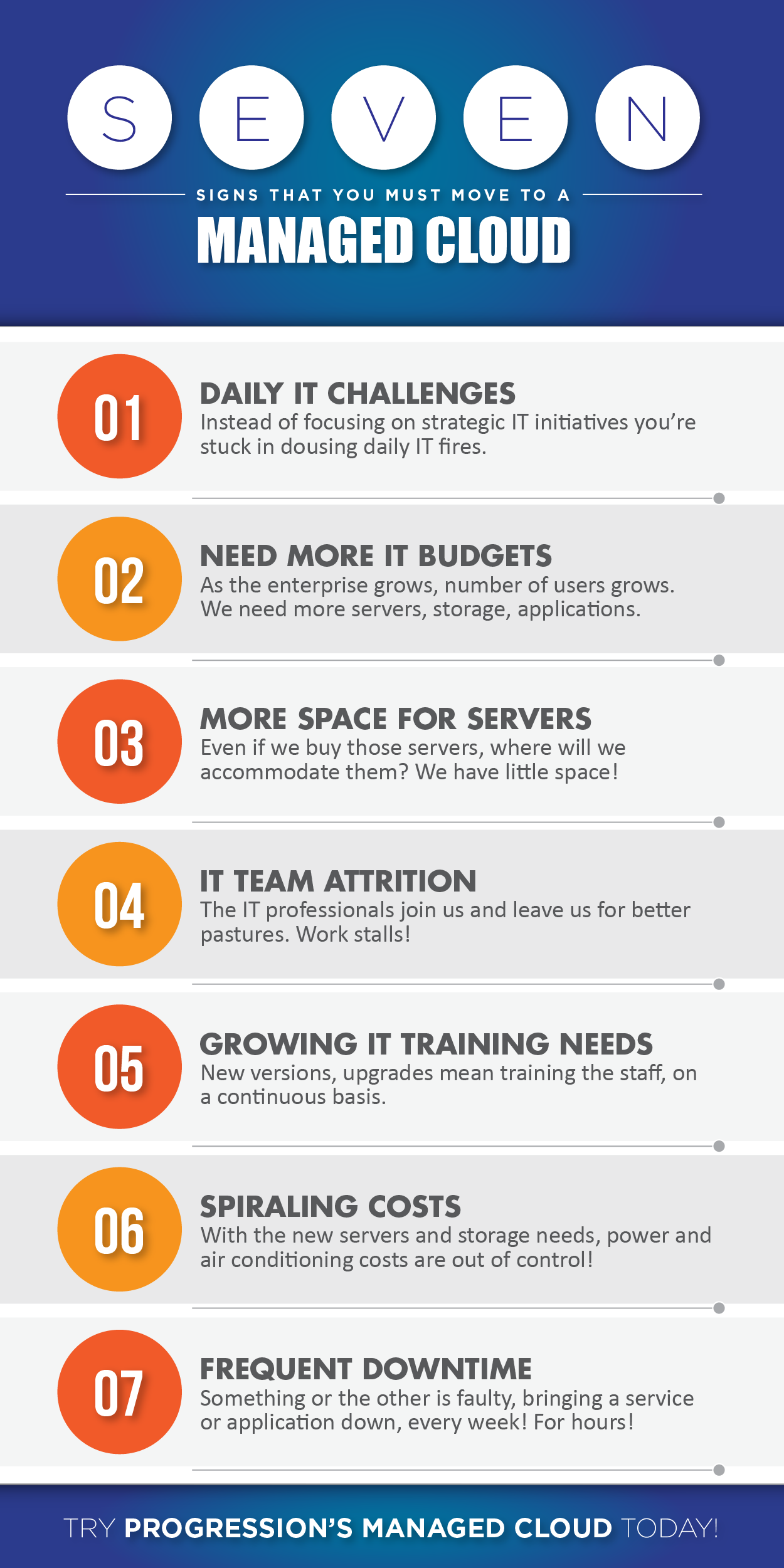IT heads of mid-size enterprises have exciting jobs, but challenging at the same time. As the business grows, they have to ensure that existing IT systems work smoothly, and new technologies and systems integrate well without disrupting any processes.
That’s an ideal situation. In real life though, they have to deal with rapid technology obsolescence, IT staff exits, manual errors, lack of processes, and the CFO slashing down IT budgets!
What should an IT head do? The answer has been blowing in the wind for a while now: move to the cloud! In fact, the better answer is to move to a Managed Cloud.
But do you really need to move to a Managed Cloud yet? Here are the seven signs that will tell you if you are ready.
1. You are always dousing IT fires: Your CEO wants you to figure out how new technologies can help the business. Instead, you are too busy handling repeated issues with the ERP or the messaging system.
With a Managed Cloud service, IT issues that cripple the productivity of the enterprise are no more your worry. They are taken care of well before they threaten the system in any way. A Managed Cloud service provider like Progression will have alerting systems in place and round-the-clock monitoring to ensure that your systems are up and running.
2. You look for new Capex budgets every few months: As the company adds employees and customers, there is no option but to add servers and storage. And budgets are hard to come by with the CFO keeping a close eye on IT expenses.
Progression’s Managed Cloud service lets you add servers and storage without having to break the bank. You move from the Capex model to Opex, which the CFO will agree is a better option.
3. You look for space to accommodate the servers: Even if the CFO approves the budget, where is the space to house these new servers? Did you know server rooms can reach up to a weight of 1400 kg/sqm? A regular building is not likely to hold more than 300 kg/sqm. Do you have the space, and does it have the capacity to hold the weight?
If your IT infrastructure runs out of a Tier3 + data center like that of Progression, you will never have to worry about servers, storage, space or load!
4. Finding power capacity and Opex budgets to support them: Buying the servers and storage is just a one-off expense. What about the spiraling power bills, air conditioning costs, and additional manpower you need? Instead of simplifying things, IT is becoming a multi-headed dragon that refuses to be tamed.
With Progression’s Managed Cloud service, power, air conditioning, diesel bills and such are not your problems to solve.
5. Training and re-training staff on existing and new technologies: With new versions, and upgrades every few days, there is a lot of training and re-training involved. It’s as if half the IT staff is always away on training!
With Progression, your challenge of running the IT infrastructure simply vanishes. You can now get your team to specialize in applications specific to the business. They will also find it satisfying to become specialized, and will start adding significant value to the business than merely handling patches and upgrades.
6. IT team attrition: Just when someone has been fully trained and can independently handle, say the custom ERP system, he is off to fresh pastures. The enterprise loses money every time this happens, and for the IT department it means systems can come to a standstill! With your IT infrastructure being handled by Progression’s Managed Cloud, IT team attrition is no more your worry. Work will not come to a stop.
7. 99.99% uptime? High availability, always on, high uptime, zero downtime are terms that IT heads only aspire to. Because in reality, there are not enough budgets, people, redundancies, processes… But if the business demands it, it’s time to move to Progression’s Managed Cloud.
To learn more how Progression’s Managed Cloud is helping enterprises break out of the daily grind of managing IT, write to reach@progression.com


